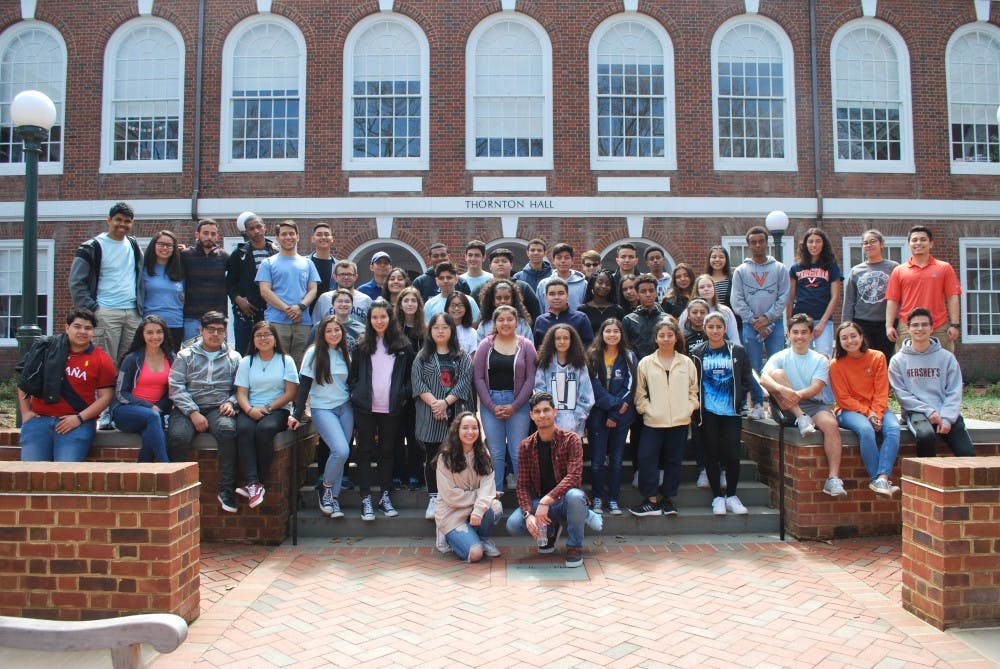This past Friday, 49 high school students eager to learn about STEM boarded buses in Northern Virginia and drove to the School of Engineering for a two-day event called Juntos Podemos, meaning “together we can.” At various locations on Grounds, including Rice, Wilsdorf and Thornton Halls, University student engineers of Hispanic background — ranging from first- to fourth-year undergraduates in addition to a graduate student — came together to introduce Northern Virginian high school students from racial and ethnic minorities to engineering and life and opportunities at college.
The Society for Hispanic Professional Engineers is a national organization that provides professional development and STEM awareness to the Hispanic community. It has chapters in most universities with an engineering school, but the University’s chapter is distinguished by its annual community outreach event Juntos Podemos.
Founded more than 10 years ago, Juntos Podemos is a student-organized overnight program that is free of cost to its attendants. High school students have the opportunity to learn and ask SHPE members about college life, STEM opportunities and financial aid. This year, the applicants to Juntos Podemos were 56.6 percent female, 92.6 percent racial and ethnic minorities and 62.7 percent potential first-generation college students. Out of the 79 students who applied, 49 attended.
“We offer … a club of students that has gone through the process of figuring out a lot of the financials by ourselves,” said Fernando Mata Cordero, fourth-year mechanical engineering student and president of SHPE. “You see this generally in SHPE — just having candid conversation and making the transition to college, STEM and to U.Va. as natural as it can be.”
The organization of the event — spanning Friday and Saturday — was led by Kathryn Gimeno, a second-year Engineering student and community outreach officer at SHPE. She and her fellow SHPE officers created a schedule of events to expose high school students to the basics of engineering and life at the University.
High school students were welcomed Friday with a talk by Gavin Garner, director of Undergraduate Studies and an engineering professor, followed by performances from student organizations like the Salsa Club and The Whethermen comedy group. Following presentations on different types of engineering, high school students stayed overnight with undergraduate student hosts in dorms, upperclassmen housing and even Lawn rooms.
Saturday began with presentations on financial aid and scholarships available to make attending college possible. Students then learned about engineering extracurriculars, toured the Rotunda and bookstore and asked the undergraduate organizers questions about university life in a panel.
Prior to leaving the University, students participated in a two-hour long hands-on engineering activity where they learned about signals, phone chargers and built a bridge.
Caroline Pavlak, a fourth-year Engineering student and event organizer, described how this program impacts under-privileged students by encouraging them to excel in high school, apply to college and major in STEM.
“Being able to see so many Hispanic engineers, proves to them that they can do it as well,” Pavlak said. “Seeing someone who looks like you and does what you want to do is very powerful.”
Cordero elaborated on the importance of solidarity and community for underrepresented groups in STEM.
“Especially when you have to go home and do hours and hours of [calculus] three or physics or whatever it is, and you’re grinding day in and day out, it can be isolating,” Cordero said. “Isolating is the word … and that’s why SHPE and the Center for Diversity in Engineering exist.”
For immigrants who are passionate about STEM but lack legal documentation of their residency in the United States, access to scholarships and opportunities is complicated.
Two high-achieving high school students originally from Honduras and Colombia described how their label of “illegal” or “undocumented” — a result of overstaying their visas due to extenuating circumstances — is hindering their dreams of becoming engineers or medical professionals.
“You don’t get any free money because you’re an [undocumented] immigrant,” one student said. “You have to work for three years or more to get that money and save it for college.”
Another explained that their undocumented status transcends their educational experience.
“It’s really tough when you don’t have papers because you don’t have healthcare, you don’t have rights, you cannot go to college, and that’s really, really tough because you want to prove yourself as a human,” another student said.
In the future, SHPE hopes to offer specific programming to undocumented students and formally connect them to DREAMers on Grounds.







